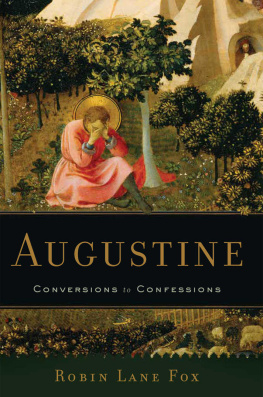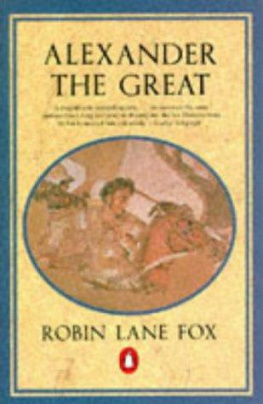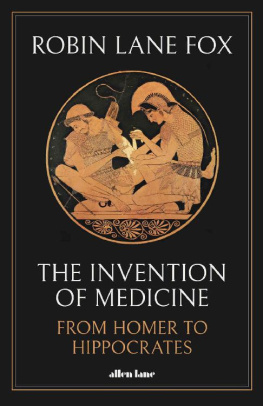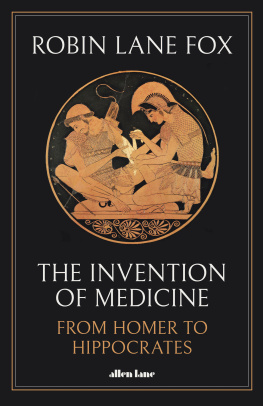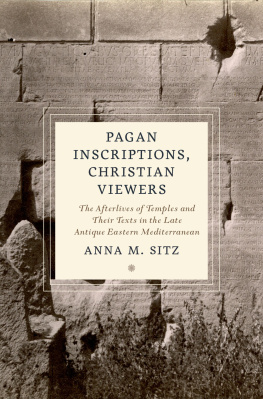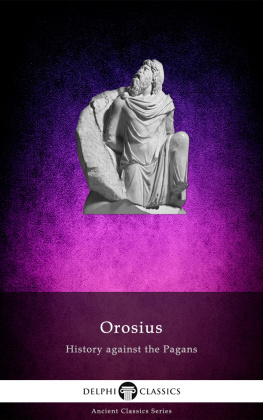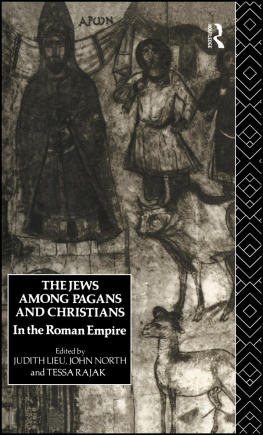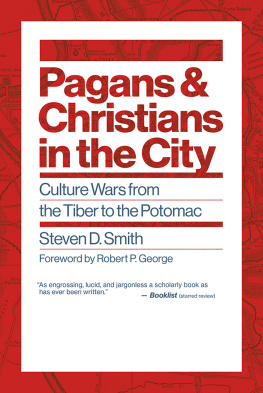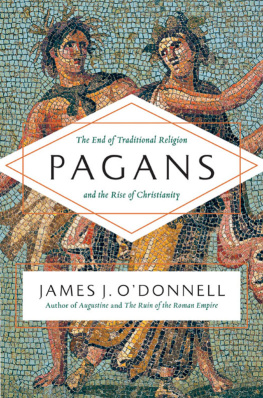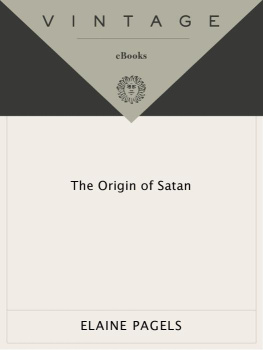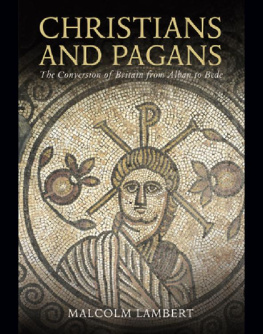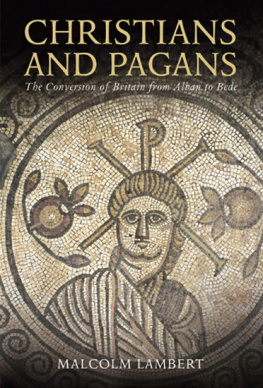PENGUIN BOOKS
PAGANS AND CHRISTIANS
Robin Lane Fox is a Fellow of New College, Oxford, and University Reader in Ancient History. His books include Alexander the Great, The Unauthorized Version: Truth and Fiction in the Bible and The Classical World, all of which are published by Penguin. He has also been the weekly gardening correspondent of the Financial Times since 1970.
ROBIN LANE FOX

Pagans and Christians


PENGUIN BOOKS
PENGUIN BOOKS
Published by the Penguin Group
Penguin Books Ltd, 80 Strand, London WC2R 0RL , England
Penguin Group (USA) Inc., 375 Hudson Street, New York, New York 10014, USA
Penguin Group (Canada), 90 Eglinton Avenue East, Suite 700, Toronto, Ontario, Canada M4P 2Y3
(a division of Pearson Penguin Canada Inc.)
Penguin Ireland, 25 St Stephens Green, Dublin 2, Ireland (a division of Penguin Books Ltd)
Penguin Group (Australia), 250 Camberwell Road, Camberwell,
Victoria 3124, Australia (a division of Pearson Australia Group Pty Ltd)
Penguin Books India Pvt Ltd, 11 Community Centre,
Panchsheel Park, New Delhi 110 017, India
Penguin Group (NZ), cnr Airborne and Rosedale Roads, Albany,
Auckland 1310, New Zealand (a division of Pearson New Zealand Ltd)
Penguin Books (South Africa) (Pty) Ltd, 24 Sturdee Avenue,
Rosebank, Johannesburg 2196, South Africa
Penguin Books Ltd, Registered Offices: 80 Strand, London WC2R 0RL , England
www.penguin.com
First published in Great Britain by Viking 1986
First published in the United States of America by Alfred A. Knopf, Inc. 1986
Published in Penguin Books 1988
Reissued in Penguin Books 2006
2
Copyright Robin Lane Fox, 1986
All rights reserved
The moral right of the author has been asserted
Except in the United States of America, this book is sold subject to the condition that it shall not, by way of trade or otherwise, be lent, re-sold, hired out, or otherwise circulated without the publishers prior consent in any form of binding or cover other than that in which it is published and without a similar condition including this condition being imposed on the subsequent purchaser
ISBN: 978-0-14-192585-1
Contents

MAPS
PREFACE
The subjects of this book need no apology for their importance. There have been many books on paganism and many more on early Christianity, but although there have been fine comparisons of their beliefs and philosophies and their views of each other, I know of no book which puts their practice side by side in a context of civic life. Eventually, books set their own pace, and although mine is long, I sympathize with the reader who felt that it should have been longer in order to do justice to its subjects. Those who try to cover two different areas of scholarship tend to satisfy experts in neither, while every general view of ancient society invites exceptions and provokes dissent. While writing about pagans, I have kept in mind the many Christians to whom they are not now familiar. While writing about early Christians, I have considered the many readers and connoisseurs of classical antiquity to whom Christian texts are unknown or a distant memory. I hope that each will gain from finding their areas of knowledge set beside others. Modern Christians tend to regard many of the early Christians with distaste. I have, however, been made aware that early Christianity is often best understood by those who would never wish to write about it.
Historians of the ancient world face two constant problems, a scarcity of evidence and the relation of its particular pieces to wider generalizations. At times, I have tried to establish the value of one piece of evidence against another or to prove the particular authority of a written text. This method is common to much legal investigation, but it is not legalistic. At others, I have tried to generalize, while citing particular statements and evidence which seem to me to have wider significance. About many people in antiquity we know only what others of a different sex or class wrote and sometimes not even that. Generalizations are therefore precarious, easier to refute than confirm. I have cited particular evidence both to give constant warning of the type of support on which I have relied and to convey its vivid style and expression, distinctive qualities about the ancient world and reasons why it continues to fascinate me.
It has been an exciting time to be writing this book because significant evidence has continued to be found on the subjects of each chapter, especially in newly published inscriptions and papyri, evergrowing sources with which I have struggled to keep in touch. Ancient history is not a static or finite subject: a lifetime ago, much that I discuss was not even available for study. Nor is this branch of it ancient to us or somehow dead and buried. While I have been writing, the Virgin Mary has been reported to be appearing as never before; a statue which seems to move is drawing a crowd as large as any in my field of study; born-again Christians, liberation theology, martyrdoms and the moral majority are but a few of the contemporary features which have caused me to reflect more deeply on the subjects which I have discussed. No generation can afford to ignore whether Christianity is true and, if it is not, why it has spread and persisted and what is the proper response to it. Historians have a particular contribution to make to these inquiries.
The origins of this book go back to my upbringing and to Eton school days when we were expected to teach ourselves the history of the Church before Constantine, to study a Gospel and the Acts in Greek and then to alarm visiting examiners with the results of our efforts. At Oxford, I coincided with a golden age of the subject, when it was possible to be taught by G. E. M. de Sainte Croix, to attend the lectures of Peter Brown and Henry Chadwick and to meet and talk with E. R. Dodds and Gervase Mathew. To them and their writings I owe much that I now seem to know. I have retained a constant awareness that they have expressed so much more in their own books and that they could have improved mine throughout. I was also fortunate to coincide with a new generation who approached these topics from other angles: I have gained much from the help of Stephen Mitchell, S. R. F. Price, S. N. C. Lieu, Garth Fowden, R. C. T. Parker, David Potter and C. J. Howgego, and from T. D. Barnes, whose important book on Constantine overtook my final chapters. In 1983, H. W. Parke kindly lent me chapters of his forthcoming book on the oracles of Asia Minor, and N. J. Richardson lent me the text of his lecture on religious experience in Homers poems. Both saved me from errors and omissions, but I have let our differences stand. More specifically, Ian Tompkins checked the text and notes of Chapter 10 and removed several mistakes; Susannah Elm did the same for Chapter 7 and taught me much from her studies of its topics. I owe a particular debt to the vigilance and insight of Mark Edwards, who helped me with the notes to Chapters 8, 11, and 13. S. J. B. Barnish was my most perceptive critic: he caused me to rethink my general picture and exposed various faults in Chapters 5 and 9. Throughout, Patricia Morison made me aware of ideas I would otherwise have missed and encouraged me by commenting acutely on what I was writing. I would also like to acknowledge all I have learned from the writings of A. D. Nock and A.J. Festugire, J. Geffcken and A. Harnack, and my old and admired companions, Joseph Binghams unsurpassed work on Christian antiquities (published in 1708) and, of course, Gibbon on the entire subject.
Next page

